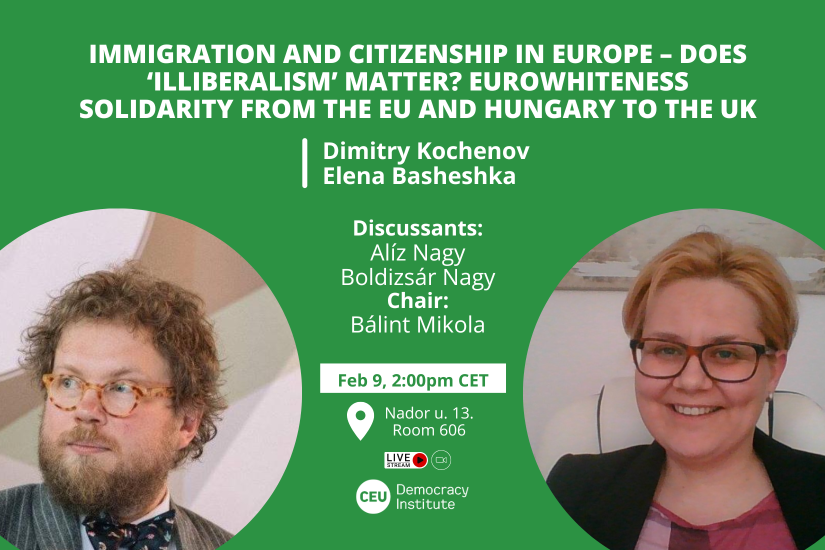
The AUTHLIB project would like to invite you to a discussion of a Working Paper entitled Immigration and Citizenship in Europe – Does ‘Illiberalism’ Matter? Eurowhiteness Solidarity from the EU and Hungary to the UK.
The event will be held in N13 606 (DI Lounge) and can also be followed online.
For accessing the discussion online, register here. To participate in person, please email MikolaB@ceu.edu.
Speakers:
- Dimitry Kochenov (Professor, CEU; Senior Research Fellow, CEU Democracy Institute) and
- Elena Basheshka (Post-doctoral Research Fellow, CEU Democracy Institute)
Discussants:
- Alíz Nagy (Assistant Professor, ELTE Faculty of Social Sciences)
- Boldizsár Nagy (Honorary Professor, ELTE Faculty of Law; Associate Professor, CEU)
Chair:
- Bálint Mikola (Post-doctoral Research Fellow, CEU Democracy Institute)
Abstract:
Immigration is one of the most divisive issues in developed countries, being a substantive political matter in national elections. Rhetoric aside, it is immigration above other topics, that dominates debates – even if uniting the right and dividing the left. While immigration attitudes have barely changed, the concern over immigration has become increasingly evident. Radical measures have been adopted across Europe on the pretext of safeguarding security – extraordinary times require extraordinary measures! From refugee bodies washing up on shores, to illegal EU pushbacks, to building walls to contain irregular immigration, to creating a hostile environment and labeling immigrants, to sending asylum seekers to Africa, Europe is not only facing an immigration crisis but also, more worryingly, a deep political crisis.
The exclusion of immigrants is yet another issue that overlaps with the politics of citizenship. It is for states, and states alone, to choose who their citizens are even if such practices imply strict preference of certain categories of citizens over others or are introduced as a radical response to security concerns. Indeed, such choice depends on the aims to be achieved by states – be that to (re)establish relations with kin minorities beyond states' borders as, for instance, in the case of Hungary, or to exclude the unwanted ones through citizenship deprivation, as in the case of the United Kingdom. Exclusions can run along any lines: geography of origin, race, religion, education, language, time, citizenship status, etc. You name it – and a legal-historical example will be found.